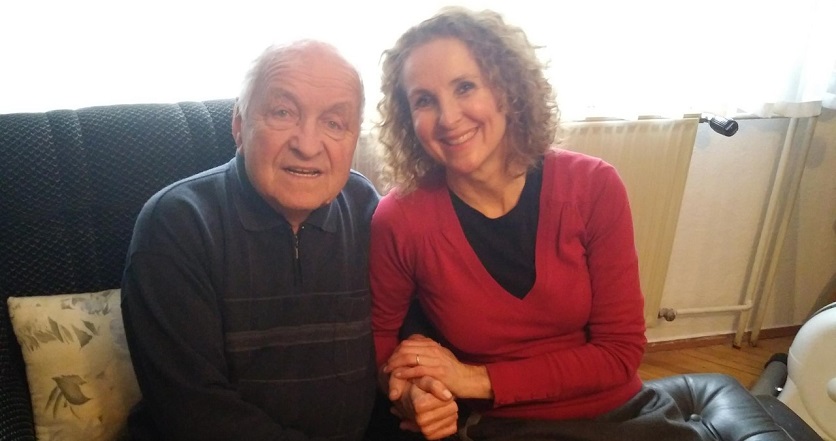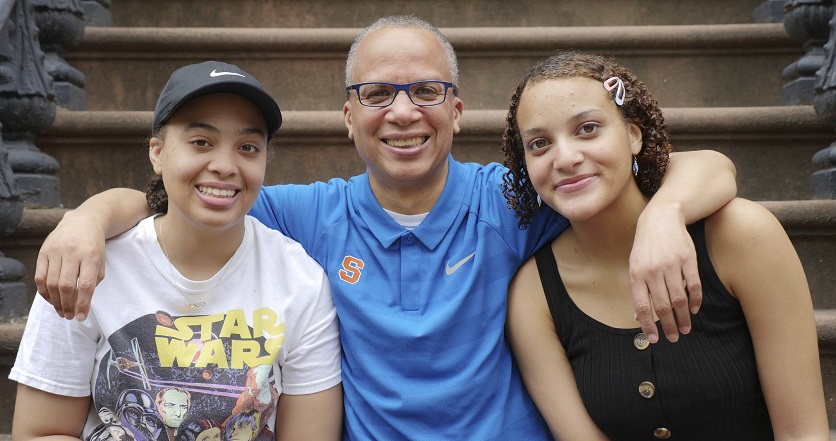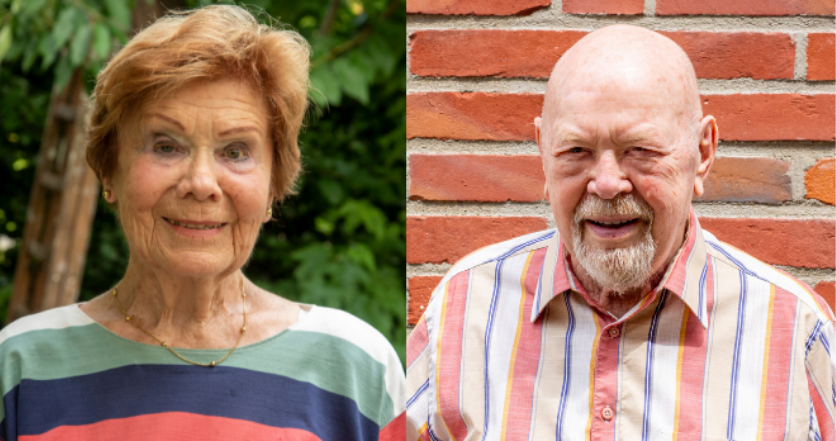Seeing Far Beyond My Blindness
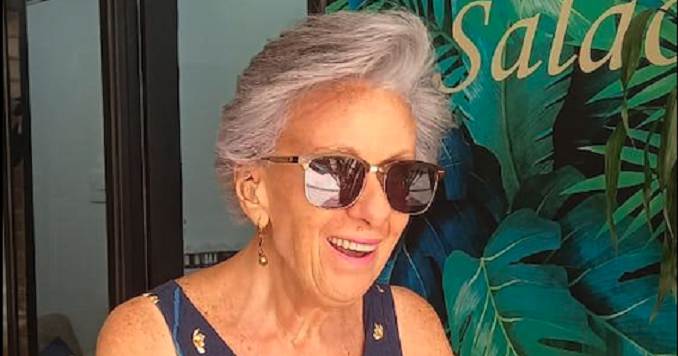
Born in Rio de Janeiro, Brazil, in 1956, Maria Cristina Serravalle Gomes begins each day by tuning in to the rhythm of her city. She has been blind since she was fifteen and has lived through many challenges, which her Buddhist practice has enabled her to embrace with a vibrant spirit and the determination to transform adversity into joy.
Each morning, when I open the window, I feel the warm wind on my face. Outside, the sounds of car horns, street vendors and loud music from the neighborhood all blend into the air. Rio de Janeiro, Brazil, awakens overflowing with energy and full of life—especially at the end of February each year, when the carnival takes over the city.
I cannot see—but I feel everything: the sounds, the wind, the energy of this pulsating city.
In the midst of this intense rhythm, I begin my day with a steady routine. I go to the kitchen and make my coffee, then I fix my hair, put on a little lipstick and sit in front of my Buddhist altar. I take a deep breath and begin chanting Nam-myoho-renge-kyo.
I cannot see—but I feel everything: the sounds, the wind, the energy of this pulsating city.
I live life at Rio’s pace—full of energy, despite the challenges. Every day, I celebrate my 68 years of life with music, love and an immense joy for living. People sometimes ask how I came to see the world through such rose-colored lenses. This strength comes from my mother, who introduced me to Nichiren Buddhism.
My Mother’s Letter
My mother gave me a letter when I turned 60, just before she passed away. It was about the day I was born. It made me realize just how much I had overcome. Here is part of that letter:
“In 1956, in Rio de Janeiro, a baby girl with blue eyes was born weighing only 900 grams. The doctors said she might never walk, speak or see. I didn’t accept this diagnosis and decided, based on my intuition, to take a different approach. The struggle was immense, but the victory was extraordinary! Happy birthday, my daughter! Congratulations! Your mother, Maria Amélia.”
I was born premature with limited vision. I had difficulty swallowing food and took time to learn to walk. I don’t even know when I started to speak. But from that moment on, I never stopped! My mother raised me to be someone who wouldn’t be defeated by disability.
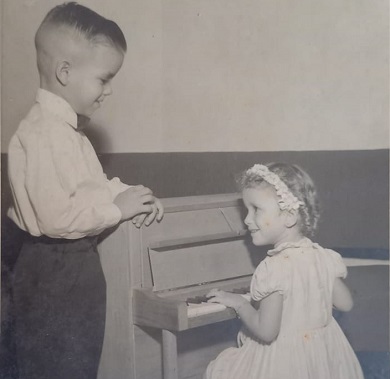
Even though I could see very little, I could see enough to ride a bike and a scooter and roller skate. I remember how much I loved touching the piano keys and riding my little bicycle. I wanted to be like other children. But, I soon realized that wouldn’t happen.
At school, kids stared at my eyes. At first, they just talked, but soon, their teasing became more malicious. The bullying hit me hard. However, I’ve never been one to bow my head.
I even got into fights at school—to the point where my mother was called to the principal’s office. My mother was worried but always stood by me.
Losing My Sight, Finding My Voice
When I was 15, my life was turned upside down. I was diagnosed with glaucoma. Despite undergoing surgery, I lost my vision completely.
I stopped studying and withdrew into my own world. Before I knew it, eight years had passed. It was during this time music entered my life.
My mother never gave up on me. She encouraged me to play the guitar or learn something new. Before, I was able to read sheet music and play the piano because I had some vision. But it was the guitar that became my faithful companion. Slowly, with lots of encouragement, my shy voice grew stronger.
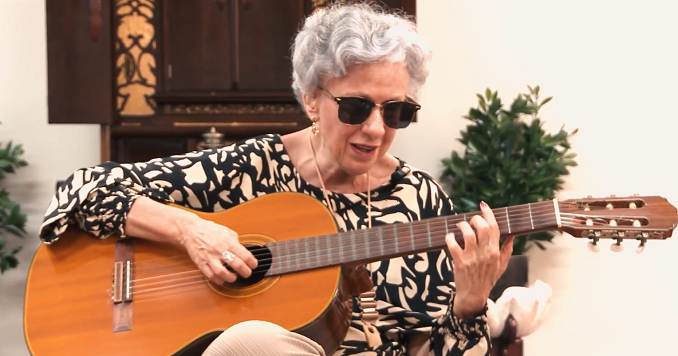
In 1982, my mother encountered the Soka Gakkai through a friend. She began chanting Nam-myoho-renge-kyo and took me along to meetings. At first, I just sat beside her while she chanted. Some members would visit me at home, but there was one member who used come and talk to me and encourage me so warmly. It made me feel good.
In 1984, I became a member of the Soka Gakkai, following in my mother’s footsteps.
The Challenges of Studying
Gradually, I became more involved in Soka Gakkai activities and began reading President Daisaku Ikeda’s writings. His words—that everyone has a unique mission only they can fulfill—deeply touched me. I realized that I too had a mission and decided to take a bold step and return to my studies—something I had given up on.
I took the university entrance exam and was admitted to the Faculty of Literature at Santa Úrsula University. But then came the challenge: How was I to study without being able to see?
That everyone has a unique mission only they can fulfill—deeply touched me.
For books that weren’t available in braille, my friends helped by reading them aloud to me. I recorded them and listened later. It was a great challenge but every day of study was a victory. I graduated—but I didn’t stop there. I went further and pursued a degree in Law. After much effort and prayer, I earned my second degree.
On graduation day, I walked on stage with my mother. When I received my diploma and felt her emotion—oh, that moment was worth everything!
My Song of Victory
Today, at 68, I manage the real estate business I inherited from my family. I am also a women’s leader in my local Brazil SGI (BSGI) area, where I serve in an advisory role, and remain ever ready to support others. The practice of chanting Nam-myoho-renge-kyo has become my song of victory.
From the beginning, I’ve felt completely accepted just as I am in the Soka Gakkai. I was entrusted with leadership roles in the Women’s Division. I opened my home for local Soka Gakkai discussion meetings, which continue to be a source of inspiration. I sometimes perform songs on my guitar at our meetings, and the joy it brings everyone is the greatest encouragement.
I also love composing songs and have even created carnival-style marchinhas to lift people’s spirits.
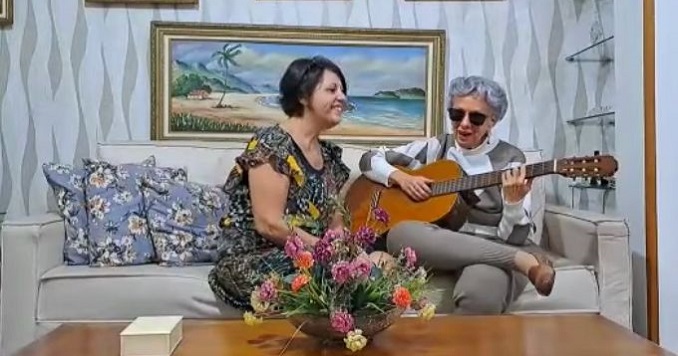
Soon, I’ll celebrate 40 years of Buddhist practice. I move forward with confidence, looking toward 2030, the centennial of the Soka Gakkai’s founding. I want to reach it feeling radiant and joyful.
My mother passed away at 93. I inherited her beautiful skin, and I still carry the most powerful elixir of all: a healthy, happy life powered by my Buddhist practice. For me, no cosmetic surgery could ever compare. Of course, I have my moments of restlessness—that’s normal—but I also have a deep anchor. Life truly is supreme.
A Gift Beyond Sight
Life hasn’t been easy, but this practice has given me a gift that goes beyond sight. It has given me purpose. It has given me the strength and courage to carry on.
The most powerful elixir of all: a healthy, happy life powered by my Buddhist practice.
I never saw my disability as a barrier. If once I only wanted to “see,” today, I see far beyond. I have found my place in the world, where I can shine in my own way, just as I am.
I believe that when we cultivate a “Buddhist way of seeing,” we realize that our potential is as infinite as the universe. With this certainty, I continue to live and face each new day in my beloved city of Rio de Janeiro.
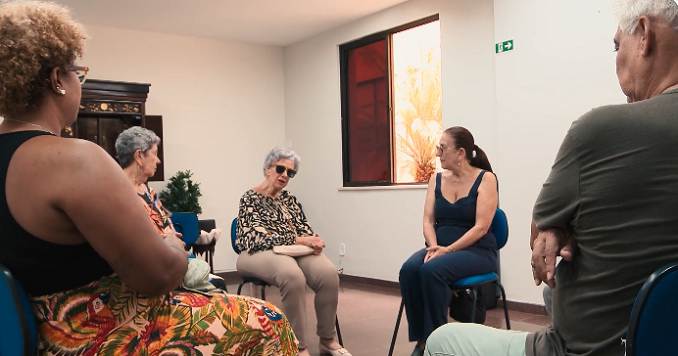
Adapted from an article in the March 21, 2025, issue of the Seikyo Shimbun, Soka Gakkai, Japan





